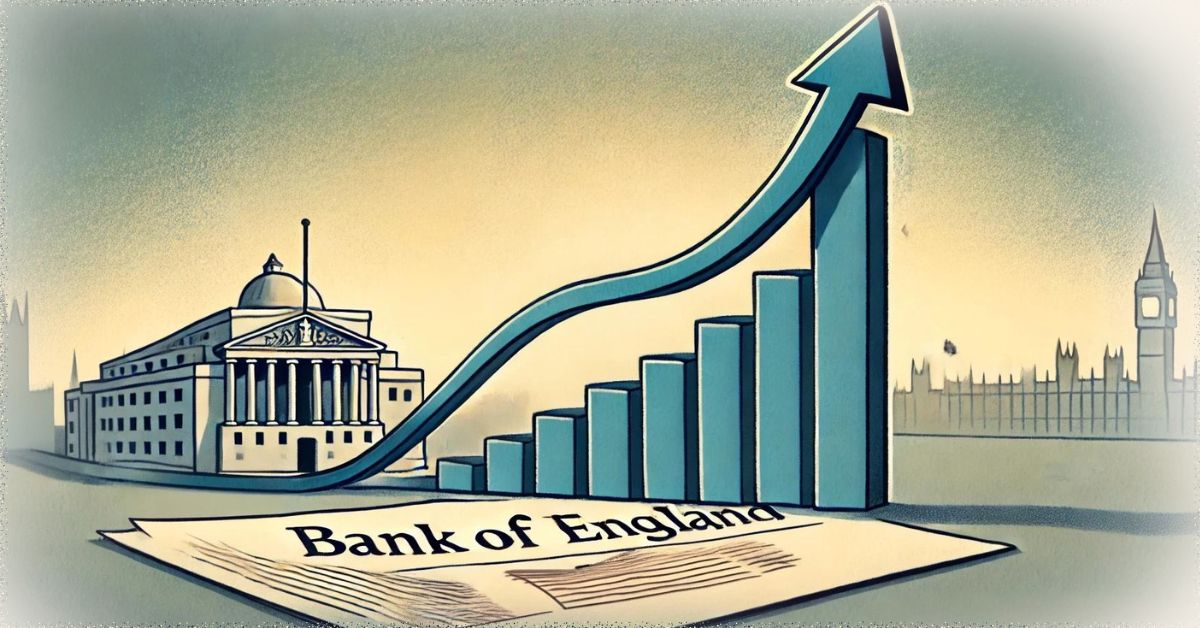Article

The recent increase in UK inflation has caught the attention of economists, businesses, and consumers alike. For the first time this year, the inflation rate has ticked upward, raising concerns about what this could mean for the future of the economy. In this blog, we’ll explore the key factors driving this change, discuss potential trends in inflation, and consider what actions the Bank of England and the UK government might take in response. Additionally, we’ll delve into how this rise in inflation could impact various investment sectors, offering insights on what investors should keep in mind as they navigate these uncertain times.
Understanding the Recent Inflation Spike: A Crucial Foundation for the Rest of the Blog
Inflation is often influenced by a complex interplay of factors, and the UK’s recent inflation rise is no exception. Some of the key contributors include:
1. Energy Prices: One of the most significant factors has been the sharp increase in energy costs. With global energy prices surging, largely due to geopolitical tensions and supply chain disruptions, UK households and businesses have seen their energy bills soar. This has a direct impact on inflation, as higher energy costs translate into higher prices for goods and services across the board.
2. Food Prices: The cost of food has also been rising, driven by factors such as adverse weather conditions affecting crop yields, increased transportation costs, and ongoing supply chain issues. As a result, grocery prices have climbed, adding pressure on household budgets.
3. Wage Growth: While wage growth is generally seen as a positive economic indicator, it can also contribute to inflation. As businesses face higher labour costs, they may pass these costs onto consumers through higher prices, further fueling inflation.
4. Global Supply Chain Disruptions: The lingering effects of the COVID-19 pandemic continue to disrupt global supply chains. Shortages of key materials and components have led to higher production costs, which companies often pass on to consumers.
Will Inflation Continue to Rise?
Predicting the future trajectory of inflation is challenging, as it depends on a range of unpredictable variables. However, based on current data and economic models, several scenarios could unfold:
1. Continued Increase: If energy prices remain high and supply chain issues persist, inflation could continue to rise in the short term. This scenario would likely prompt the Bank of England to consider further interest rate hikes to curb inflationary pressures.
2. Stabilisation: Inflation could stabilise if some of the contributing factors ease. For example, if global energy prices begin to fall or supply chain disruptions are resolved, the upward pressure on inflation could diminish.
3. Government and Central Bank Intervention: The UK government and the Bank of England have tools at their disposal to manage inflation. These could include tightening monetary policy by raising interest rates, implementing fiscal measures to reduce consumer demand, or intervening in specific markets like energy to stabilise prices.
Impact on Investment Sectors
Rising inflation doesn’t just affect prices at the supermarket or energy bills; it also has significant implications for various investment sectors. Here’s a detailed look at how inflation might impact different types of investments, empowering you to make informed decisions:
1. Equities (Stocks):
• Impact: Stocks can be a mixed bag during inflationary periods. On one hand, companies that can pass on higher costs to consumers without reducing demand may see their stock prices remain stable or even increase. On the other hand, companies with less pricing power or those heavily reliant on consumer spending might struggle, leading to volatility in stock prices.
• Investor Tip: Focus on sectors that traditionally perform well during inflation, such as utilities, consumer staples, and energy, as these companies often have greater pricing power.
2. Bonds:
• Impact: Bonds are typically less attractive during periods of rising inflation because their fixed interest payments lose purchasing power as inflation increases. This is especially true for long-term bonds.
• Investor Tip: Consider inflation-protected securities, such as UK inflation-linked gilts, which adjust payments based on inflation rates, offering better protection against rising prices.
3. Real Estate:
• Impact: Real estate can be a good hedge against inflation, as property values and rental income often rise with inflation. However, higher interest rates—often used to combat inflation—can increase borrowing costs, which might cool down property markets.
• Investor Tip: Focus on real estate investments that can adjust rental rates regularly, such as residential or commercial properties with shorter lease terms.
4. Commodities:
• Impact: Commodities tend to perform well during inflationary periods as their prices usually rise with inflation. This includes assets like gold, oil, and agricultural products.
• Investor Tip: Diversify your portfolio with a mix of commodities to hedge against inflation. Gold, in particular, is often seen as a safe haven during times of economic uncertainty.
5. Cash:
• Impact: Holding large amounts of cash during inflation is generally unfavourable, as its purchasing power diminishes over time.
• Investor Tip: Keep only the necessary cash reserves for short-term needs and consider moving excess cash into investments that are more likely to keep pace with or outpace inflation.
The recent rise in UK inflation has sparked concerns about what the future holds. While it’s challenging to predict with certainty whether inflation will continue to rise, it’s essential for consumers, businesses, and investors to stay informed and prepared. By understanding the factors driving inflation and considering its potential impact on various investment sectors, you can make more informed decisions to protect your financial well-being.
As always, staying ahead of economic trends and regularly reviewing your financial strategy are key tactics for navigating inflationary periods successfully. Whether you’re a seasoned investor or just starting out, being proactive in your approach will help you weather whatever the future may bring.





